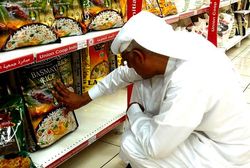Saudi Gazette | 5 Oct 2011
By Saleh Al-Zahrani
JEDDAH -- There are a number of problems hindering an efficient implementation of the King Abdullah Initiative for Saudi Agricultural Investment Abroad, according to a Ministry of Commerce and Industry report.
The project aims to create a strategic reserve of food and commodities such as rice, wheat, barley, corn and soybeans, and secure animal resources to help the Kingdom achieve food security, prevent food crises and keep prices stable.
Problems in the countries targeted for investment include weak infrastructure including the lack of power, railways, paved roads, backup services and marketing channels, along with poor irrigation networks that would require major investments, the report said.
Costs of basic needs such as electricity, water and fuel place additional burdens on investors, the report added.
Other problems in foreign countries include: slow customs procedures, complicated procedures to implement privileges guaranteed by investment regulations and the establishment of laws and legal interpretations that adversely affect investments, the report said.
The challenge is compounded because there are lengthy procedures for investors to enter the market, several different taxes imposed on them, a lack of transparency in applying investment laws and the investors' lack of commitment to sending annual reports on projects' performance, which is required for tax exemptions, according to the report.
Some investors are slow in executing projects, which leads them to request extensions of exceptions, especially those relating to taxes, the report added.
Dr. Abdullah Al-Maglouth, head of a research and studies center, called on the Ministry of Agriculture to work on removing these obstructions so the Kingdom can fill the gaps it is suffering in terms of food and commodity supplies.
Prices of basic crops are expected to keep rising until at least 2015 due to climate change, problems with water resources, and the tendency among some Western countries to use crops for energy production, he said.
Dr. Al-Maglouth warned that the Kingdom's annual food costs could reach SR50 billion, which would be about 10 percent of the state budget.
By Saleh Al-Zahrani
JEDDAH -- There are a number of problems hindering an efficient implementation of the King Abdullah Initiative for Saudi Agricultural Investment Abroad, according to a Ministry of Commerce and Industry report.
The project aims to create a strategic reserve of food and commodities such as rice, wheat, barley, corn and soybeans, and secure animal resources to help the Kingdom achieve food security, prevent food crises and keep prices stable.
Problems in the countries targeted for investment include weak infrastructure including the lack of power, railways, paved roads, backup services and marketing channels, along with poor irrigation networks that would require major investments, the report said.
Costs of basic needs such as electricity, water and fuel place additional burdens on investors, the report added.
Other problems in foreign countries include: slow customs procedures, complicated procedures to implement privileges guaranteed by investment regulations and the establishment of laws and legal interpretations that adversely affect investments, the report said.
The challenge is compounded because there are lengthy procedures for investors to enter the market, several different taxes imposed on them, a lack of transparency in applying investment laws and the investors' lack of commitment to sending annual reports on projects' performance, which is required for tax exemptions, according to the report.
Some investors are slow in executing projects, which leads them to request extensions of exceptions, especially those relating to taxes, the report added.
Dr. Abdullah Al-Maglouth, head of a research and studies center, called on the Ministry of Agriculture to work on removing these obstructions so the Kingdom can fill the gaps it is suffering in terms of food and commodity supplies.
Prices of basic crops are expected to keep rising until at least 2015 due to climate change, problems with water resources, and the tendency among some Western countries to use crops for energy production, he said.
Dr. Al-Maglouth warned that the Kingdom's annual food costs could reach SR50 billion, which would be about 10 percent of the state budget.













